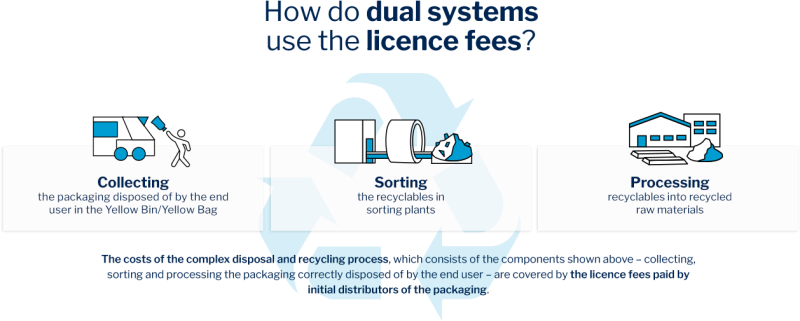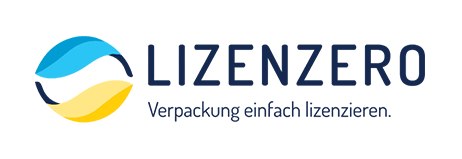Are you already taking responsibility for your packaging? Find it out!
Whether you are a small or medium-sized business, an eBay seller, a young start-up or a long-established top dog, an online or brick-and-mortar retailer: if you use packaging as a company, you have a responsibility to take part in its recycling. And this is where we come into play as a dual system: we take care of the entire disposal process and, in particular, the recycling of packaging waste - and are therefore your partner when it comes to packaging legislation. And the most important thing? We work together to protect resources and the climate.


Online retailers
Do you have an online shop and send goods to your customers?
Marketplace retailers
Do you sell products via one or more online marketplaces?



Producers
Do you make and sell your own products?
Importers
Do you import products from abroad?
Intermediaries
Do you buy products and sell them on?
Packaging licensing that can do more
How it works
Calculate licence fee
Enter your packaging volumes per material in our calculator.
If you don't know your volumes, our calculation tool can help.
Create a Lizenzero account
The next step is to create your customer account.
This will give you access to many great services that will make your life easier (e.g. volume download for LUCID).
Close licence
Select your payment method and confirm the conclusion of the contract. That's it!




Achieve more
We not only recycle your packaging and thus save large volumes of greenhouse gases and primary raw materials, but also renaturalise a piece of moorland under the motto ‘We want Moore’.
You can find all the information here.

Achieve more
We not only recycle your packaging and thus save large volumes of greenhouse gases and primary raw materials, but also renaturalise a piece of moorland under the motto ‘We want Moore’.
You can find all the information here.
What our customers say
Packaging that falls under the Packaging Act
Whether plastic film, cardboard boxes or glass bottles: all packaging that accumulates at the end consumer's home and is therefore used as sales packaging must be licensed in accordance with the German Packaging Act (VerpackG). This applies from the very first packaging and regardless of the packaging material. But what's the point? It's simple: you pay the licence fee for the packaging you use and in return we collect, sort and recycle your packaging.
Why packaging licensing?
How dual systems work
With your licence fee, we organise the entire disposal and recycling process from the moment the packaging is disposed of. In concrete terms, this means that we have the waste bins emptied, then sort everything in our sorting facilities and process the materials into recycled raw materials that can then be reused to manufacture new products.
In this way, together with you, we actively close the cycle of raw materials and thus ensure great savings. How many resources do we save together? We show you every year with your personal resource conservation certificate!


FAQ:
‘Who does the Packaging Act apply to?’
Small businesses in particular ask themselves the question ‘To whom does the Packaging Directive of the Packaging Act actually apply?’ The answer is simple: All obligations under the Packaging Act apply equally to all distributors of sales packaging, regardless of the size of the business, and therefore from the first packaging filled and put into circulation.
Every commercial distributor is subject to the provisions of the Packaging Act. Small businesses must therefore licence their packaging volumes and register with the Central Agency Packaging Register in the same way as wholesalers and manufacturers. The only difference is the obligation to submit a declaration of completeness, which only applies once a certain volume of packaging has been placed on the market.
The de minimis limits associated with the declaration of completeness in accordance with Section 11 (4) VerpackG are identical to the values from the Packaging Ordinance in force until the end of 2018.
In detail, these are as follows:
- 80 tonnes of glass packaging
- 50 tonnes of packaging made from paper, cardboard or cardboard
- 30 tonnes of packaging made from another material
From a formal legal point of view, however, the Central Agency Packaging Register has the option of requesting a declaration of completeness even if the packaging falls below the de minimis limits. This should only affect small businesses in individual cases, for example.
In the context of the question ‘To whom does the Packaging Act apply?’, the question of the validity of the Packaging Act for B2B transactions always resonates. The Packaging Act is very clear on this point and expressly excludes trade between companies from the system participation obligation. The dual systems only deal with packaging that goes to private end consumers. So if a company, for example from the mechanical engineering sector, orders spare parts for a machine from another company, this is not covered by the Packaging Act, nor is the purchase of raw materials, tools, etc. The decisive factor here is always that the packaging remains on the market.
The definition of private final consumers in the VerpackG is interesting in this context. This does not only apply to private individuals in the colloquial sense, but also to restaurants, canteens, hotels, barracks, administrations or educational and cultural institutions, museums, leisure facilities, cinemas, sports facilities or service stations. All packaging that accumulates there must therefore also be licensed via the dual systems.
In the context of the question ‘To whom does the Packaging Act apply?’, the so-called ‘system participation obligation’ or ‘packaging licensing’ is often mentioned, as it is one of the core aspects of the Packaging Act. But what exactly does this mean? And in which system does participation have to take place?
To answer these questions, it is worth taking a look at the original intention of the Packaging Ordinance as the predecessor to the Packaging Act. The intention was to make manufacturers and retailers who put packaging into circulation, which typically ends up with private end consumers, responsible for its disposal. By paying a ‘licence fee’ to a company recognised as a dual system, which takes over the collection, sorting and recycling for the product owner, the latter participates in the corresponding system and thus fulfils its ‘system participation obligation’.
At the beginning of the Packaging Ordinance, the system participation obligation only applied to DSD - Duales System Deutschland GmbH (DSD) - or Der Grüne Punkt, which was founded in 1990. This private-sector company was founded before the Packaging Ordinance came into force by a group of companies with roots in the food and packaging industry. The term ‘dual’ refers to the fact that a municipal waste disposal system already existed and continues to exist, which was then supplemented by the collection of recyclable waste. The Yellow Bag and the Yellow Bin were thus born and manufacturers and retailers were subject to the system participation obligation from 1 December 1991 and 1 January 1993 respectively.
The Packaging Act continues the obligation for system participation and packaging licensing from the Packaging Ordinance and has expanded this by creating the Central Agency Packaging Register (ZSVR) with the LUCID Packaging Register. This means that the legally prescribed fulfilment of system participation is now much more transparent and violations can be better sanctioned.
The fact that dual systems (initially only the Green Dot) were created for this purpose is due to the fact that waste disposal could not have been imposed on manufacturers or retailers. Dual systems are dedicated exclusively to this issue and have the relevant expertise and infrastructure to collect waste directly from private end consumers.
The definition of ‘private end consumers’ is decisive for the question of the system participation obligation, but also for the question ‘To whom does the Packaging Act apply?’. This is because only packaging that typically accumulates with private end consumers must be licenced. In addition to end consumers in the colloquial sense of the word, this also includes all forms of catering, cultural and leisure facilities, sports facilities, administrations, etc. Any manufacturer or retailer who delivers to such institutions is subject to the system participation obligation.
This includes all packaging made from the following materials:
- Cardboard, paper, cardboard
- Aluminium, other metals
- Glass
- Composite materials (beverage cartons)
- Plastics
- Other packaging
- Ferrous metals/tinplate
- Other materials such as wood, cork, etc.
The Packaging Ordinance (VerpackV) introduced in 1991 was the first time that the obligation to dispose of recyclable waste was transferred from the municipalities to the private sector. Thus, the so-called system participation obligation was created, whereby the end consumer is not responsible for the disposal of their waste, but rather the initial distributor must dispose of it, based on the principle of product responsibility.
To a certain extent, the Packaging Ordinance can be seen as a pilot project for the so-called product responsibility principle, which was regulated in detail from 1996 in the Closed Substance Cycle and Waste Management Act (KrW-/AbfG). The full title of the ordinance was ‘Ordinance on the Avoidance and Recycling of Packaging Waste’. The aim was obvious: instead of leaving responsibility for the disposal of packaging to consumers and local authorities and thus having it financed by taxpayers' money, companies were made responsible for their packaging as distributors and thus product owners. The new Packaging Act continues this system.
The Packaging Ordinance recently proved to be no longer functional. The dual systems were increasingly used by so-called free riders who did not fulfil their system participation obligation, which even an amendment to the Packaging Ordinance could not change.
The Packaging Act (VerpackG), which replaced the Packaging Ordinance at the beginning of 2019, was also passed to change this and, in addition to the obligation to participate in the system, now provides for a registration and data reporting obligation with the Central Agency Packaging Register (ZSVR) via the LUCID database. This makes it possible to transparently track which companies have fulfilled their obligations under the Packaging Act.
The German Packaging Act (VerpackG) transposes the European Packaging Directive 94/62/EG into German law.
In order to dispose of and recycle packaging that falls under the system participation or licensing obligation, there are currently nine providers that are referred to as dual systems and can be considered as partners in fulfilling the licensing obligation under the Packaging Act. The term is actually a little misleading because the entire waste management and disposal system is also referred to as a ‘dual system’ in accordance with the Packaging Act.
Initially, especially during the Packaging Ordinance, Der Grüne Punkt - Duales System Deutschland GmbH (DSD) still had a monopoly in this area, but this ended in 2003. Since then, other system operators have gradually been authorised, with the result that a number of companies now operate in free competition with each other. These include the dual system Interzero, which is behind Lizenzero and was founded in 1991.



